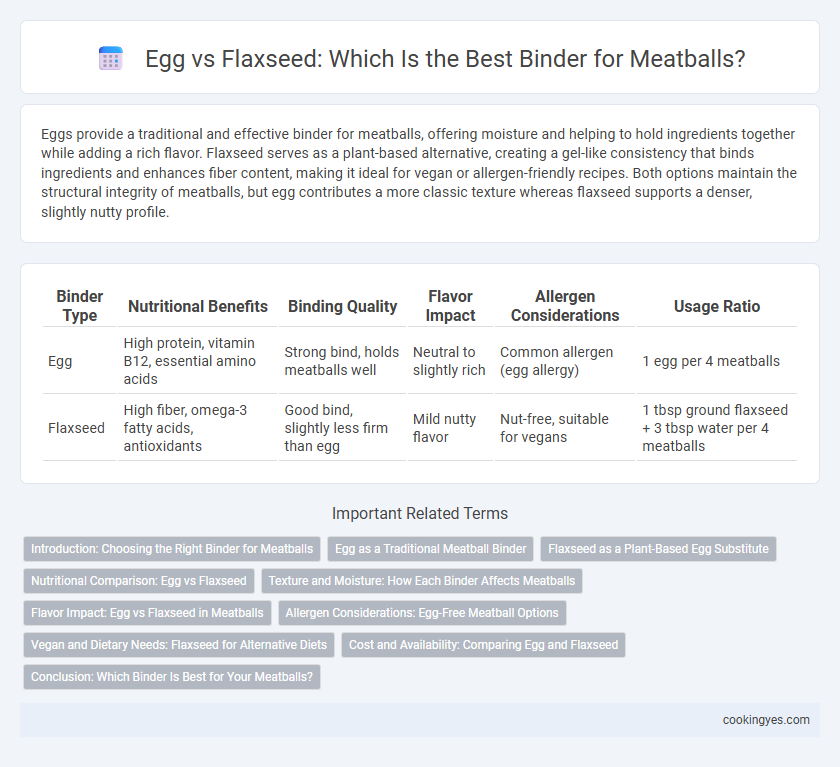Eggs provide a traditional and effective binder for meatballs, offering moisture and helping to hold ingredients together while adding a rich flavor. Flaxseed serves as a plant-based alternative, creating a gel-like consistency that binds ingredients and enhances fiber content, making it ideal for vegan or allergen-friendly recipes. Both options maintain the structural integrity of meatballs, but egg contributes a more classic texture whereas flaxseed supports a denser, slightly nutty profile.
Table of Comparison
| Binder Type | Nutritional Benefits | Binding Quality | Flavor Impact | Allergen Considerations | Usage Ratio |
|---|---|---|---|---|---|
| Egg | High protein, vitamin B12, essential amino acids | Strong bind, holds meatballs well | Neutral to slightly rich | Common allergen (egg allergy) | 1 egg per 4 meatballs |
| Flaxseed | High fiber, omega-3 fatty acids, antioxidants | Good bind, slightly less firm than egg | Mild nutty flavor | Nut-free, suitable for vegans | 1 tbsp ground flaxseed + 3 tbsp water per 4 meatballs |
Introduction: Choosing the Right Binder for Meatballs
Eggs provide a classic binder for meatballs by offering rich protein content that helps maintain structure and moisture during cooking. Flaxseed serves as a plant-based alternative rich in omega-3 fatty acids and fiber, producing a gel-like consistency that binds ingredients effectively. Selecting between egg and flaxseed depends on dietary preferences, texture desired, and nutritional goals without compromising the meatball's integrity.
Egg as a Traditional Meatball Binder
Egg serves as a traditional meatball binder, providing a superior adhesive quality that ensures meatballs hold their shape during cooking. Rich in proteins and emulsifiers, eggs contribute to a moist, tender texture while enhancing flavor and structural integrity. Compared to flaxseed, eggs offer a more reliable binding capability, making them the preferred choice in classic meatball recipes.
Flaxseed as a Plant-Based Egg Substitute
Flaxseed acts as an effective plant-based egg substitute in meatball recipes, providing a binder that maintains moisture and texture without altering flavor. When mixed with water, ground flaxseed forms a gel-like consistency that mimics the binding properties of eggs, enhancing the structural integrity of meatballs. This vegan-friendly option boosts fiber and omega-3 content, making it a nutritious alternative for those seeking egg-free or plant-based meatball binders.
Nutritional Comparison: Egg vs Flaxseed
Eggs provide high-quality protein, essential amino acids, and vital nutrients like vitamin B12 and choline, crucial for muscle repair and brain function in meatball recipes. Flaxseed offers a plant-based source of omega-3 fatty acids, fiber, and lignans, promoting heart health and aiding digestion while serving as a vegan-friendly binder. Choosing between egg and flaxseed depends on dietary preferences and nutritional goals, balancing protein density against fiber and healthy fat content for optimal meatball texture and health benefits.
Texture and Moisture: How Each Binder Affects Meatballs
Eggs create a tender, moist meatball texture due to their high fat and protein content that binds ingredients cohesively. Flaxseed, rich in fiber and omega-3 fatty acids, produces a denser, slightly firmer meatball with less moisture retention. Using eggs results in juicier meatballs, while flaxseed offers a drier, more textured bite ideal for those seeking a plant-based binder.
Flavor Impact: Egg vs Flaxseed in Meatballs
Egg as a meatball binder imparts a rich, savory depth that enhances the overall flavor profile, creating a traditional and moist texture. Flaxseed, with its subtle nutty and earthy undertones, offers a unique twist but can slightly alter the classic taste, providing a more plant-forward nuance. The choice between egg and flaxseed affects not only the binder's binding efficacy but also the flavor complexity, impacting the final sensory experience of the meatball.
Allergen Considerations: Egg-Free Meatball Options
Egg-free meatball options using flaxseed as a binder cater to individuals with egg allergies or sensitivities, reducing the risk of allergic reactions commonly triggered by egg proteins. Flaxseed provides a natural source of omega-3 fatty acids and soluble fiber, enhancing the texture and moisture retention of meatballs without compromising flavor. This allergen-friendly alternative ensures safe and inclusive dining experiences for people avoiding eggs while maintaining the structural integrity of traditional meatballs.
Vegan and Dietary Needs: Flaxseed for Alternative Diets
Flaxseed serves as an excellent egg substitute in meatballs, especially for vegan and plant-based diets, due to its ability to bind ingredients while adding essential omega-3 fatty acids and fiber. Unlike eggs, flaxseed provides allergen-free, cholesterol-free properties that cater to individuals with dietary restrictions or egg allergies. Incorporating ground flaxseed mixed with water into meatball recipes ensures cohesive texture and moisture, meeting diverse dietary needs without compromising flavor or structure.
Cost and Availability: Comparing Egg and Flaxseed
Eggs offer a widely accessible and affordable binder option for meatballs, with prices typically ranging from $0.10 to $0.20 per egg, making them an economical choice in most markets. Flaxseed, while slightly more expensive at approximately $0.15 to $0.30 per tablespoon of flaxseed meal, provides a plant-based alternative that is increasingly available in grocery stores and health food markets. Both binders are commonly stocked, but eggs remain more consistently available globally, whereas flaxseed's availability can vary depending on regional demand and specialty store presence.
Conclusion: Which Binder Is Best for Your Meatballs?
Egg is the superior binder for meatballs due to its excellent protein content and emulsifying properties, which create a firmer texture and help retain moisture during cooking. Flaxseed offers a plant-based alternative with added fiber and omega-3 fatty acids but may result in a softer, less cohesive meatball. For traditional, juicy meatballs with optimal binding, egg remains the best choice; however, flaxseed suits vegan or allergen-free recipes where texture compromise is acceptable.
Egg vs Flaxseed for meatball binder Infographic

 cookingyes.com
cookingyes.com